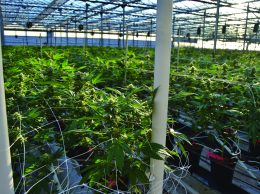
Henry Dubroff
In light of the recent election, it’s worth noting that Colorado sales from recreational marijuana soared to $1 billion in fiscal 2015 and the state’s haul of tax revenue has risen to $135 million.
But the election of Donald Trump and his selection of Sen. Jeff Sessions as the attorney general-designate have rattled that state’s political leadership. Just as they were getting comfortable with a new “pot” of money to pay for schools and infrastructure, it may get taken away. And that has huge implications for California, which passed a recreational pot ballot measure a month ago.
While much of the mainstream media has focused on Session’s conservative views and the 1980s controversy over some allegedly racist remarks, not as much attention has been played to the nominee’s staunch law-and-order positions on marijuana.
Federal laws going back decades make it illegal to grow marijuana, sell it or use the banking system to finance marijuana-related activities. The Obama administration has provided leeway not to enforce the federal statutes on growing and sale of cannabis products in states that have legalized pot but the ban on using the banking system for marijuana-related activities remains in place.
It should also be noted that Session’s prospective boss, one Donald J. Trump, does not drink alcohol, smoke anything or even, according to the New York Times, enjoy caviar. With one big caveat, explained below, that makes it highly unlikely the president-elect would stop Sessions from a major crackdown on cannabis.
For a state like California, which expects to bring the industry on line in 2018, there are jobs, money and financing questions at stake.
Given that California is eight times larger than Colorado by population, the marijuana business promises to be perhaps as large as $10 billion in annual revenue with perhaps $1 billion or more in tax haul for Sacramento and local governments. That doesn’t count payroll taxes, sales taxes and building permits for the marijuana growing facilities springing up in California City and other places at the edge of the desert.
But not so fast. Sessions, according to reports, is likely to take a tough line on marijuana cultivation, particularly in the large capacity greenhouses that are sprouting up or being converted from flower growing.
Next, there could be a crackdown on financing activities. Already, the marijuana business is done strictly with cash. Even a hint that pot dollars are flowing through the banking system under today’s laws can get you arrested.
Sessions could substantially delay and certainly curb the cannabis industry by disrupting the flow of cash. Tough Bank Secrecy Act rules and anti-money laundering rules already are in place to disrupt the underground economy that’s sprung up around the drug trade.
Without large production facilities and some way to move cash around in what otherwise would be a $10 billion enterprise statewide, it’s possible that pot in the Golden State will have a much longer gestation period than in Colorado or Washington state. Most experts think it will be 18 months before the regulated sale of recreational pot could begin under normal circumstances.
The wild card in the pot crackdown equation is, of course, Trump himself. The president-elect is not an ideologue and doesn’t toe the party line. He’s part federalist, part socialist, part fiscal conservative and part libertarian.
He’s also got to find money to pay for his tax cuts, his defense plans and his pledge to defend Social Security and Medicare. Levying a huge federal excise tax on marijuana is one of the very few sources of revenue open to an administration that’s promised to fix entitlement, expand defense spending and cut taxes — all at the same time.
Marijuana, whether legal or illegal, is one of the nation’s vast untapped sources of tax revenue.
Given that one point for legalizing marijuana is to remove the incentives from the Mexican gangs who grow it and bring it across the border – or just grow it in the Los Padres National Forest – the crackdown on pot may be a prelude to a massive new tax regime that provides jobs and tax revenue not just for states that legalize it but for the federal government as well.
Legalization and taxation are hard to imagine today because it would take Congress to revise the anti-pot laws on the books and tax legislation to replace prison terms with new excise levies. But we’ve just witnessed one tectonic plate shift in the political landscape and legalizing pot would make Trump a hero in blue states the GOP never could have imagined to capture.
Perhaps rather than try to get Mexico to fund a wall it will be cannabis smokers who pony up the funds to pay for it. For now, that’s cash only, please.
• Reach Editor Henry Dubroff at hdubroff@pacbiztimes.com.






 Print
Print Email
Email


















It’s genuinely astounding that there are people gazing at the horizon expecting the imminent arrival of the Federal cavalry riding in to strike down State laws that re-legalize cannabis. It’s even more astonishing when Californians do so after almost 20 years and 4 trips to the SCOTUS for the Compassionate Use Act (CUA) with that law still in force.
The Feds have given their answer to State laws they don’t like…there’s nothing that they can do about those laws. Yes, the Feds can enforce their laws using their resources. But Californians have seen that first hand. The Feds haven’t been able to shut down the CUA and it’s pushing two decades now.
Federal preemption? Doesn’t anyone ever wonder why the only cases using that lame argument have been filed by State and Local authorities?
City of Garden Grove v Felix Kha, 157 Cal. App. 4th 355; 68 Cal. Rptr. 3d 656 (2007)
County of San Diego v San Diego NORML 165 Cal. App. 4th 798; 81 Cal. Rptr. 3d 461 (2008)
State of Arizona v Valerie Okun, Case No. 1 CA-CV 12-0094 (AZ Ct. App., Div. 1, Jan. 10, 2013)
The cases listed above were all prosecuted using that theory, and none of the petitioners got a ruling in their favor. Not even in the local Courts which traditionally are likely to favor local authorities. None of the cases listed could find any Federal Court that had any interest in hearing their lame arguments.
In John Ter Beek vs City of Wyoming (2014) the respondents did manage to get the local, elected Judge to back the attempt by the City of Wyoming to use Federal law as a ruse to get out of doing their job but the Michigan Court of Appeals promptly overturned and the Michigan Supreme Court made that ruling final.
If people are going to act all self righteous about the law, then they should learn the law. The Federal government is not the boss of the States. The States are the boss of the Federal government.
In the end, the Feds don’t really have much of a choice other than the status quo or descheduling marijuana altogether.
“[A] federal crackdown would backfire by producing an atomized, anarchic, state-legalized but unregulated marijuana market that federal drug enforcers could neither contain nor force the states to contain.”
https://www.brookings.edu/research/marijuana-policy-and-presidential-leadership-how-to-avoid-a-federal-state-train-wreck/amp/?client=safaris